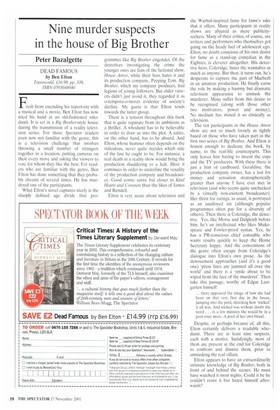Nine murder suspects in the house of Big Brother
Peter Bazalgette
DEAD FAMOUS by Ben Elton Transworld, f16.99, pp. 339, ISBN 0593048040
Fresh from extending his repertoire with a musical and a movie, Ben Elton has now tried his hand at an old-fashioned whodunit. It is set in a Big Brother-style house during the transmission of a reality television series. For those Spectator readers even now not familiar with the genre, this is a television challenge that involves throwing a small number of strangers together in a location, putting cameras on their every move and asking the viewers to vote for whom they like the best. For readers who are familiar with the genre, Ben Elton has done something that they probably dreamt of several times. He has murdered one of the participants.
What Elton's novel captures nicely is the sharply defined age divide that pro grammes like Big Brother engender. Of the detectives investigating the crime the younger ones are fans of the fictional show, House Arrest, while their boss hates it and its production company. Peeping Tom. Big Brother, which my company produces, had legions of young followers. But older viewers didn't just avoid it, they regarded it as o-tempora-o-mores evidence of society's decline. My guess is that Elton tends towards the latter group.
There is a tension throughout this book that is quite separate from its ambitions as a thriller. A whodunit has to be believable in order to draw us into the plot. A satire, on the other hand, has to be absurd. And Elton, whose humour often depends on the ridiculous, never quite decides which side of the line he ought to be. For instance, a real death in a reality show would bring the production shuddering to a halt. Here it continues in order to underline the venality of the production company and broadcaster. Good comic satire but closer to Kind Hearts and Coronets than the likes of James and Rendell.
Elton is very acute about television and the Warhol-inspired fame for fame's sake that it offers. Many participants in reality shows are abjured as mere publicityseekers. Many of their critics, of course, are writers and performers who themselves got going on the heady fuel of adolescent ego. Elton, no doubt conscious of his own desire for fame as a stand-up comedian in the Eighties, is cleverer altogether. His detective hero, Coleridge, hates the wannabes as much as anyone. But then, it turns out, he's desperate to capture the part of Macbeth in an amateur production. He finally earns the role by making a hammy but dramatic television appearance to unmask the murderer. Many suffer from this desire to be recognised (along with those other two motivators, power and money). No medium has mined it so clinically as television.
The ten participants in the House Arrest show are not so much loosely as tightly based on those who have taken part in the first two series of Big Brother. And Elton is honest enough to dedicate the book, by name, to the real-life counterparts. This only leaves him having to invent the cops and the TV producers. With these there is just a hint of cardboard. Geraldine, the production company owner, has a lust for money and sensation stratospherically greater than anyone I have ever met in television (and who seems quite unchecked by a virtually non-existent broadcaster). Her thirst for ratings, as usual, is portrayed as an unalloyed sin (although popular programmes often pay for a diversity of others). Then there is Coleridge, the detective. Yes, like Morse and Dalgleish before him, he's an intellectual who likes Shakespeare and Fowler-proof syntax. Yes, he has a PR-conscious chief constable who wants results quickly to keep the Home Secretary happy. And the conventions of the genre often escape from Coleridge's dialogue into Elton's own prose. As the denouement approaches (and it's a good one) 'press lines are jammed all over the world' and there is a 'smile about to be wiped from the face of the murderer'. Then take this passage, worthy of Edgar Lustgarten himself:
... there appeared the image of how she had been on that very first day in the house, jumping into the pool, shrieking how 'wicked' it all was. And wicked was without doubt the word . . . in a few minutes she would be in a pool once more. A pool of her own blood.
Despite, or perhaps because of, all this, Elton certainly delivers a readable whodunit. There are at least nine suspects, each with a motive. Satisfyingly, most of them are present at the end for Coleridge to confront and dismiss them, prior to unmasking the real villain.
Elton appears to have an extraordinarily intimate knowledge of Big Brother, both in front of and behind the scenes. He must have watched it most nights. Could it be he couldn't resist it but hated himself afterwards?






















































































 Previous page
Previous page